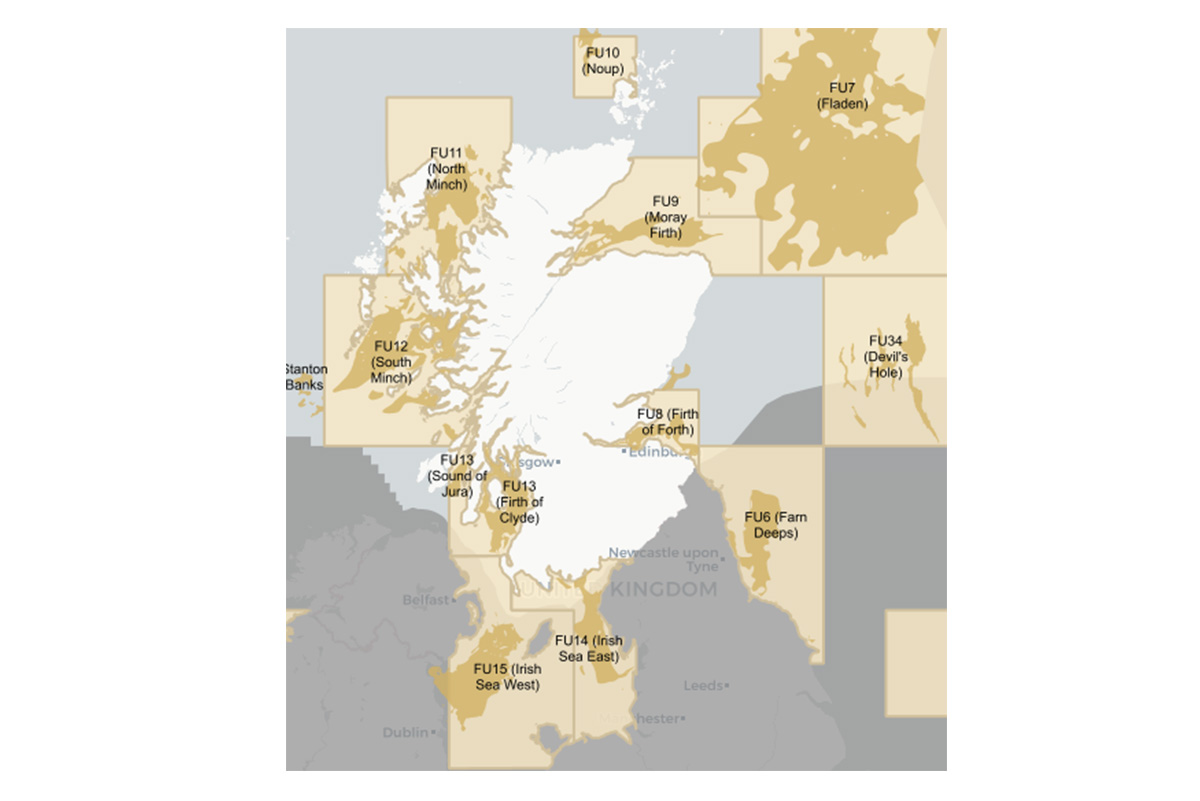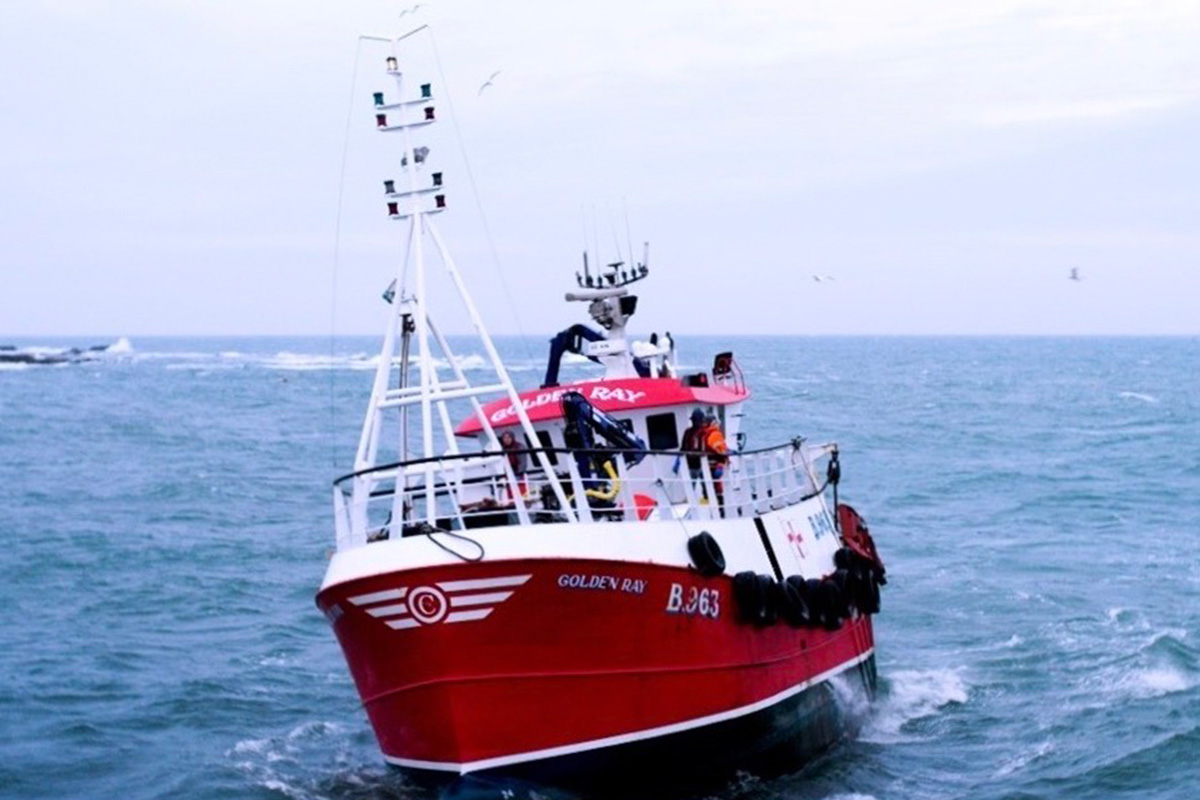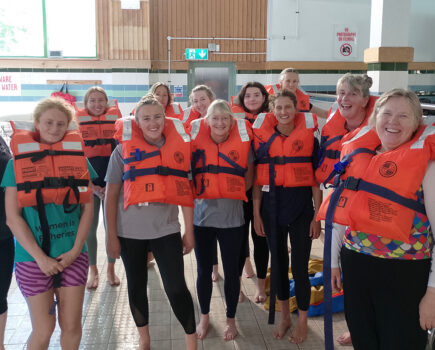An NGO that has been trying for months to orchestrate a consumer boycott of scampi, and then attempted to get supermarkets to de-list scampi products, finally managed a mention on the BBC last week, with ITN expected to follow, after it upped the stakes and filed a formal complaint with the Competition and Markets Authority (CMA).
Open Seas has, throughout the iterations of its campaign, consistently ignored the fact that the Nephrops stocks that contribute to the scampi industry are fished to quotas recommended by ICES, which now also provides advice on the impact of bycatch in directed fisheries and takes this into account when setting quotas.

The separate prawn grounds in the north of the UK – other grounds are found further south, west of Ireland, and as far away as the Rosemary Bank. Achieving MSC accreditation for the fishery would not be easy – each separate population of Nephrops would need its own paper trail and assessment, in a fishery where many stocks are combined into the same TAC – but it is quite possible. ICES already provides advice on management of each individual functional unit, including bycatch advice, in stocks that have been studied for more than a generation.
The NGO received £260,000 from Greenpeace in 2022, accounting for more than half of its income. Its many claims include seabed damage from the ‘heavy’ nets used, high levels of bycatch, and discards of juvenile Nephrops.
Open Seas has now asked the CMA to rule that statements by retailers that the Nephrops used in their products are sustainably sourced are misleading consumers. CMA guidelines require marketing claims to be truthful, accurate and ‘clear and unambiguous’.
The CMA, and many of the retailers, have strongly denied that they are misleading customers. The British Retail Consortium said retailers were working closely with suppliers to ‘ensure products meet customer expectations on sustainability’.

The Portavogie-based prawn trawler Golden Ray B 963, skippered by Fishing News Awards 2023 Over-10m Fisherman of the Year Darren McClements, has been at the forefront of successful trials of a new low-headline trawl in the Irish Sea fishery, to eliminate whiting and cod from the catch. This move, along with similar projects evaluating a twin codend trawl in the Farne Deeps, and a move towards trawl doors that avoid seabed contact, are building on steady improvements in selectivity and reduced seabed footprint in the prawn fleet over the last two decades.
Harry Wick, CEO of the Northern Ireland FPO – many of whose members are reliant on the prawn fishery and, given the unique biology of the Irish Sea stock, particularly reliant on the scampi market – said: “We don’t hide from scrutiny, but given the frequency with which Open Seas misreports even the most basic of facts, I’d fully expect a Competition and Markets Authority investigation to quickly reveal their claims as baseless.
“I suppose their thinking is that it doesn’t matter what you shout – as long as you shout it loud enough, you’ll still fool some of the people some of the time. But I can see this one backfiring for them. I don’t think UK consumers, UK retailers or the CMA are quite the fools they take them for.”
Mike Park, chief executive of the Scottish White Fish Producers’ Association, told FN: “Open Seas has made a number of claims in its campaign, most of them based on cherry-picked data that fail to stand up to any scrutiny.
“For example, they claim that there is a kilo of discards for every kilo of prawns landed. That figure came from a single trial, more than a decade ago, using a 40mm mesh that was there as a control against which to measure more selective nets that became the norm many years ago – in a fishery that has improved every aspect of its environmental footprint over the last two decades.
“Trying to wreck the markets, when all sensible arguments about management measures have failed, is copybook behaviour from NGOs that want to see the end of fishing. We saw the same in France, where NGOs have successfully undermined the market for deepwater species such as blue ling. That is hurting Scottish vessels working off the west coast, which are seeing much softer prices as a result.”
Prawn industry continues journey to third-party accreditation
Unlike the market for langoustine, which is mainly export-driven, the vast majority of scampi produced in the UK is consumed here. The market in the UK is split evenly between retail sales, mainly in supermarkets, and the pub and restaurant trade – each worth around £75m a year.
The scampi industry alone is estimated to support 3,000 direct jobs, and be the main source of income for 700 vessels. Major supermarket and restaurant chains have public commitments to sell only MSC-certified fish, or those on the way to certification, by 2027.
Retailers and the catching sector have been working together towards this target for a number of years, with support from Seafish.
“In Scotland, the new Future Catching Policy, and the development of Fisheries Management Plans for Nephrops – a legal requirement under the new Fisheries Act – are opportunities for the industry to fully transition to MSC accreditation,” Mike Park said.
“Prawn stocks themselves are in good shape – it is demonstrating that we can maintain each individual population above MSY that is the challenge. We’ve made huge strides with more selective gear, with reduced bottom contact – all of which is demonstrated by good science and data, not wild claims.
“In the end, fishing is a business, and boats have to be profitable, but many of the improvements we have introduced have helped this – lower drag means lower fuel bills, and better selectivity makes for better-quality catches, and reduced work for crew.
“There is also the requirement from buyers who need independent assurance on our social responsibilities towards crew, which we are also making huge progress on.”
The process all costs money – a fact that one major buyer acknowledged to FN. “Both the catching industry and processors ashore are putting in time and effort to be able to demonstrate that all aspects of the fishery are sustainable and responsible,” its spokesperson said.
“We fully accept that there is a cost for the different third- party certifications, one that we would like to be able to pay for, through increased prices we pay to the boats landing to us.
“Scampi is a real UK success story, notwithstanding wild claims from NGOs that have failed to engage with the public – hence this last-ditch gimmick of complaining to the CMA. We are confident that third- party assurance will ensure that retailers and the catering trade can continue to celebrate this success long into the future.”
By Andy Read, Editor, Fishing News
This story was taken from the latest issue of Fishing News. For more up-to-date and in-depth reports on the UK and Irish commercial fishing sector, subscribe to Fishing News here or buy the latest single issue for just £3.30 here.
Sign up to Fishing News’ FREE e-newsletter here.








